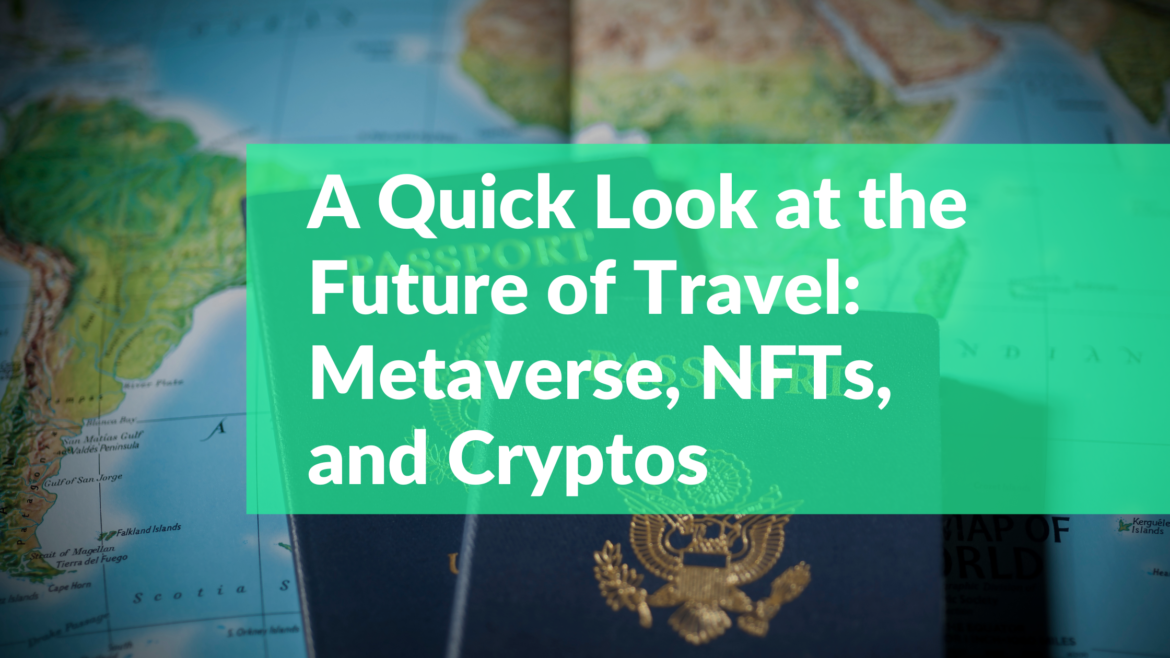Although the pandemic had halted travel for more than a year, 2022 was the year of recovery.
Next year, 2023, is expected to be even better, but with some changes.
Indeed, in recent years, we have witnessed the rise of new technologies; a continuation of the crypto market with non-fungible tokens (NFTs) and metaverse gaining popularity.
In addition, advancements in devices and technology have enabled Virtual Reality (VR) and Augmented Reality (AR) to grow rapidly.
Despite appearing to flow in opposite directions, the travel industry and crypto, NFTs, and the metaverse will converge. How? Let’s find out through this article.
How cryptocurrency will impact travel: a new payment option
It all began with cryptocurrencies. After Satoshi Nakamoto, the pseudonym used by the person or people responsible for building the first Bitcoin software, introduced cryptocurrency into the world in a 2008 paper, the market has grown into a huge market with over 22,000 different cryptocurrencies currently available.
In many cases, cryptocurrency has shown to be useful. They not only eliminate some of the common issues connected with traditional banking institutions, but they are also a handy and speedy method of payment.
In this respect, they may play a significant role in the travel sector in 2023 and beyond. Hotels, airlines, cruise lines, and other businesses in the travel sector may begin accepting cryptocurrency as a means of payment, streamlining transactions while providing a transparent track record.
The role of NFTs in the travel industry
NFTs are the second component of Web3 that is expected to play a major role in the travel industry in the next years. These unique digital identifiers, which cannot be duplicated, swapped, or subdivided and are stored on a blockchain, have acquired considerable popularity over the last two years.
NFTs, which began as a type of digital art, have quickly demonstrated their use; whether as a certificate, a key pass, a ticket, or access to special perks.
Because of their applications, these digital collectibles are projected to soon rule travel.
For example, the ticketing sector has long had issues related to fraud and scams, which frequently resulted in people purchasing fake tickets on illegitimate websites appearing as officially approved ticketing agents, resulting in lost funds and disappointment.
In this regard, NFTs may be useful in resolving such challenges; they may give a clear history and show that they were issued by the original provider, confirming that they are authentic and legitimate.
This might also happen in the travel industry, since individuals frequently book flights and hotels via websites other than the original ones.
As a result, NFTs may soon replace paper and digital tickets, providing assurance that they are legitimate and not a waste of money.
NFTs, in addition to representing a booking ticket, may also be the key access to unique advantages, whether supplied by hotels or travel companies.
As an example, a hotel may provide additional amenities such as a gym, a wellness center, and beverages and food which are normally charged extra. The possibility of having NFTs indicating the right to such additional benefits, for example, would remove any ambiguity about the guests’ rights and result in a well-planned operation within the hotel or guesthouse.
How the metaverse will impact travel
The metaverse, or virtual world, is also expected to play a key role in the tourism industry starting in 2023.
Advances in VR and AR technologies will significantly improve the digital world by allowing individuals to undertake tasks that would otherwise prevent them from booking a hotel or visiting a place.
According to a recent report from Booking.com, one of the major online travel companies, the metaverse will play an important part in vacation planning, with almost half (42%) showing interest in using virtual reality to plan their vacations in the coming year.
People will be able to virtually tour destinations, sense them, and choose whether to travel to one site over another.
Virtual reality may also be used to virtually tour hotels and vacation homes before making a reservation; guests can digitally explore the hotel, the room they would like to book, and other services offered (such as gym, spa, and more).
Conclusions
Although we cannot predict that virtual reality will replace in-person travel, it is certain that a mix of cryptocurrencies, NFTs, and the metaverse will play a significant role in the future.
Whether it’s merely taking a virtual tour before booking or paying in a completely different way, these innovative solutions will make transactions and procedures easier for both customers and travel businesses.
Time will tell if they will completely replace or supplement traditional approaches and procedures.


